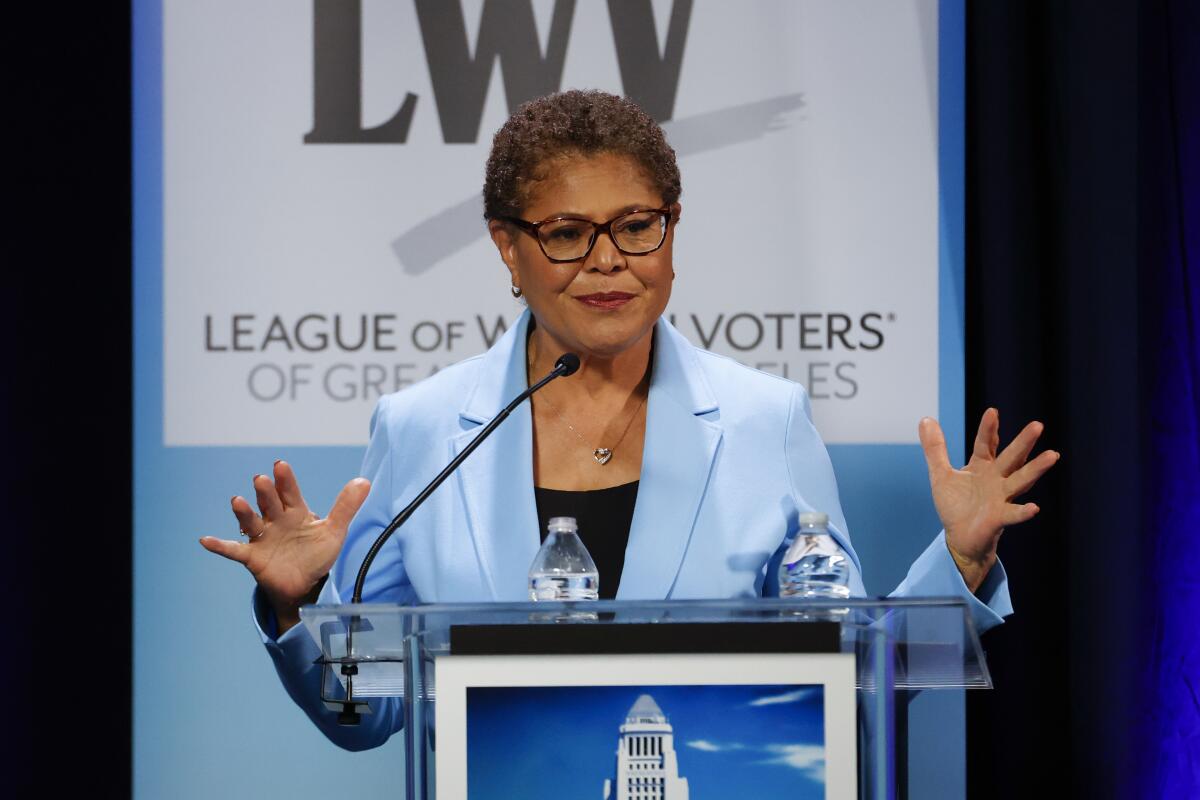Karen Bass wants to end homelessness. Are know-how and connections enough?

- Share via
In 1990, a physician’s assistant who worked in the emergency room at L.A. County-USC Medical Center saw impoverished and homeless patients on a daily basis, and she wanted to do something about conditions in the neighborhoods they came from.
So she and other activists established the Community Coalition, a nonprofit service provider whose goal was “to organize the community to turn despair and homelessness into action.”
U.S. Rep. Karen Bass, now running for mayor, will need to do a lot of that if she is elected.
If you believe the polls, Bass and billionaire businessman Rick Caruso lead the pack at the moment. When I interviewed Caruso recently, by the way, his staff arranged for me to meet him at the Grove, his signature mall. Bass asked me to meet her at 81st Street and Vermont Avenue, home of the Community Coalition.
The candidate, years removed from her medical career, wanted to talk about how she intends to heal the city, moving it beyond years of escalating homelessness influenced by poverty, addiction, mental illness and housing shortages.
“This is the whole foster care campaign we did,” Bass said, pointing to black-and-white photos of the early days of Community Coalition demonstrations around the plethora of liquor stores, the crack epidemic and other causes. She pointed to a man participating in a coalition rally and said: “Now, he was homeless.”
Bass’ work back then convinced her of a need to serve in the state Legislature, where she was Assembly speaker for two of her six years. She’s been in Congress since 2011 and served for two years as chair of the Congressional Black Caucus.
In the mayoral race, Rick Caruso’s message is everywhere: He can fix L.A. Except that running the city is not like running the Grove.
On the one hand, she’s got experience and connections that would be useful if she’s elected mayor. On the other hand, the homelessness epidemic is in large part the result of failures not just at the city level, but at the state and federal levels as well. So I asked Bass if she thought she deserved any blame for the catastrophe in the city she wants to run.
“I have no problem with being held accountable,” Bass said. But she ticked off some of the many legislative initiatives she’s focused on to address inequity, including school funding equality, criminal justice reform and the Family First Services Prevention Act — a landmark child welfare reform package crafted with bipartisan congressional support.
As for homelessness, when Bass rolled out her plan in January, I wrote that it was more than a little underwhelming.
Not that I disagreed with her call to treat homelessness like a five-alarm emergency, to build more temporary and permanent housing (she said she’d house 15,000 people in her first year), develop better mental health and addiction treatment systems, do more homelessness prevention, pry more state and federal money loose and work more closely with the county.
But we’ve heard the same promises for years, and the problem has gotten only worse.
“I don’t think I have necessarily big ideas,” Bass told me, but she had no trouble spelling out in depth how she wants to put her compassion, outrage, legislative know-how and connections to work not just to reduce homelessness, but to end it.
I always get suspicious when a politician talks about ending homelessness with a set of promises that sound more like a wish list than a plan of action. Is that even possible in a state with million-dollar shacks, widespread poverty and underperforming schools? Is it possible when much of what we see on the streets is a result of forces beyond local control, with an economy that crushes far more people than it elevates?
And yet, if the notion of ending homelessness is naïve, Bass doesn’t sound at all unaware of the complexities she’d be taking on.
“Homeless people are not monolithic,” she said, so no one solution will work for two people. We’d need a far bigger army than is now deployed to do the outreach on the streets, she said. And she seems to understand — not all candidates do — that we’d need another army on the other side, because without long-term case management, a lot of people don’t stay housed.
She recalled the story of my friend Nathaniel, a classically trained musician, and how long it took for mental health workers and me to earn his trust and help him get indoors. It took a year, and 17 years later, he still needs that support. Not every homeless person requires that, but many do — especially those with serious mental illness.
Bass said she’d work with the county to create the clinics that never materialized after mental hospitals closed. “There’s a big chunk of land in Palmdale and maybe we could create a village out there,” she said, and in her perfect world, that wouldn’t be the only one.
Bass said she doesn’t just have working relationships with the five county supervisors, but she considers them friends, and she’s got a direct line to state and federal department heads and politicians, all the way up to the Oval Office.
“I can pick up the phone and call Xavier Becerra,” she said of the U.S. secretary of Health and Human Services.
As someone who was in medicine during the crack epidemic, Bass said, she understands the science of addiction. The meth that’s become such a scourge is so powerful, Bass said, that she’d go to work with federal colleagues to extend rehab beyond 30 days, because that’s not enough time for recovery to stand a chance.
Get the lowdown on L.A. politics
Sign up for our L.A. City Hall newsletter to get weekly insights, scoops and analysis.
You may occasionally receive promotional content from the Los Angeles Times.
When she ran the Community Coalition, Bass said, many of the service providers the agency hired were formerly homeless and/or incarcerated. She said she sees no reason why many of the tens of thousands of homeless people can’t be rehabilitated, rehoused and signed up for outreach, cleanups and graffiti detail. There’s an untapped workforce there.
Given the resistance of many homeless people to group shelters, where there’s often little or no privacy, Bass said she wants to challenge architects to come up with better design concepts.
She wants to recruit interfaith ministers and philanthropists in a “moral crusade” to help address what is a humanitarian crisis and sad commentary on a country of such unprecedented wealth, and she wants to “put out a clarion call,” perhaps creating a local version of the Peace Corps.
These would all be massive, difficult and expensive undertakings, and the twin forces of bureaucracy and petty politics have laid waste to lesser ambitions.
Bass, who recalls watching news of the civil rights and antiwar movements with her father as a young girl, said she still sees people of color, and others, struggling today as they did when she was a young medic and activist.
“I know how difficult this is going to be,” she told me, adding that she’s always been motivated by the tragedy of people on the streets, and there are far too many of them out there now. “I don’t have anything to lose, and I don’t have anything holding me back.”
steve.lopez@latimes.com
More to Read
Sign up for Essential California
The most important California stories and recommendations in your inbox every morning.
You may occasionally receive promotional content from the Los Angeles Times.















